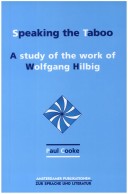Amsterdamer Publikationen zur Sprache und Literatur
1 primary work
Book 141
Wolfgang Hilbig is a writer who is widely acknowledged as one of the most important to have emerged from the former GDR. In this study, the first in English, Paul Cooke explores the interplay of aesthetic and social 'taboos', as defined by the official discourse of the GDR, in a cross-section of Hilbig's critical writing, poetry and prose. The protagonists in Hilbig's texts suffer from a profound crisis of identity due to the disparity between the state's official presentation of life in the East and their own experience. Cooke argues that through their exploration of the 'taboo', i.e. that which is excluded from the state's official discourse, Hilbig's characters attempt to break through the banal rhetoric of the ruling elite in order to realise an authentic sense of self.
